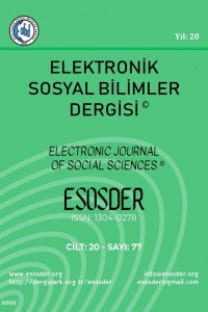TÜRKİYE'DE ALKOL REKLAMLARINA İLİŞKİN DÜZENLEMELERİN MEDYA ORTAMINDAKİ YANSIMALARI
Reklam, düzenleme, ortak denetim
REFLECTION OF REGULATIONS ABOUT ALCOHOL ADVERTISINGS IN MEDIA IN TURKEY
Advertising, regulation , coregulation,
___
- Adab, V. & Compiègne, I. (1992). Langage et Publicité. Paris: Bréal.
- Atkin, C. K., Hocking, J. & Block, M. (1984). Teenage drinking: Does advertising make a difference? Journal of Communication, 34(2), 158.
- Austin, E. W. & Knaus, C. (2000). Predicting the potential for risky behavior among those ‘‘too young’’ to drink as the result of appealing advertising. Journal of Health Communication,5, 13–27.
- Austin, E. W. & Nach-Ferguson, B. (1995). Sources and influences of young school-age children’s general and brand-specific knowledge about alcohol. Health Communication, 7, 1–20.
- Cohen-Tanugi, L. (1992).Le droit sans l’Etat, 3 e éd., Paris, P.U.F., 150.
- Degrave, E., «Mieux légiférer» La corégulation et l’autorégulation dans la politique législative européenne, http://www.crid.be./pdf/publics/5554.pdf , Şubat 12, 2011, Elden M. (2004). Reklam Yazarlığı. (2. Baskı) İstanbul: İletişim Yayınları.
- Elden, M., Ulukök Ö.&Yeygel S.(2005). Şimdi Reklamlar…İstanbul:İletişim.
- Gentile, D., Walsh D., Bloogreen, J., Atti, J. &Normand, J. (2001). Frogs Sell Beer: The Effects of Beer Advertissements on Adolescent Drinking Knowledge, Attitude and Behavior. Paper presented at the Biennial Conference of the Society for Research in Child Development (April, 2001), Minneapolis, Minnesota .
- Grant, B.F. & Dawson ,D.A. (1997). Age at onset of alcohol use and its association with DSM-IV alcohol abuse and dependence. Journal of Substance Abuse, 9, 103-110.
- Grube, J. W. & Wallack, L. (1994). Television beer advertising and drinking knowledge, beliefs, and intentions among school children. American Journal of Public Health, 84,254–259.
- Kocabaş, F. & Elden, M. (2009). Reklamcılık Kavramlar, Kararlar, Kurumlar (2. Baskı). İstanbul: İletişim Yayınları.
- Leiber, L. (1996). Commercial and Character Slogan Recall by Children Aged 9 to 11 Years: Budweiser Frogs Versus Bugs Bunny. Berkeley, CA: Center on Alcohol Advertising. Martin, C. S., Arria, A. M., Mezzich, A. C. & Bukstein, O. G. (1993). Patterns of polydrug use in adolescent alcohol abusers. American Journal of Drug and Alcohol Abuse, 19, 511-5
- Palzer, C. La corégulation en Europe: Condition générales de mise en oeuvre de cadres corégulateurs en Europe. IRIS Observations juridiques de l’Observatoire européen de l’audiovisuel, www.obs.coe.int/oea_publ/iris_special/2003.html , Mart 16, 2011, Shaffer, A. (1997). Acohol Advertising and Motor Fatalities. The Review of Econmics and Statistics, 79 (3), 432-442.
- Stacy, A., Zogg, J., Unger, J.&Dent, C. (2004). Exposure to Televised Alcohol Ads and Sunsequent Adolescent Alcohol Use. American journal of Health Behaviour. 28 (6), 498-50
- Tokol, T. (1996). Pazarlama Yönetimi (7. baskı). İstanbul: Ceylan Matbaacılık.
- Tremblay, V. & J, Okuyama K. (2001). Advertising restriction, competiton and alcohol comsumption. Contemporary Economic Policy, 19 (3), 313-321.
- TÜİK Sağlık Araştırması 2008, 43.
- Unger, J., Schuster, D., Zogg, J., Dent, C.& Stacy, A. (2003). Alcohol Advertising Exposure and Adolescent Alcohol Use: A Comparison of Exposure Mesure. Addiction Research and Theory, 11 (3), 177-193.
- Wallack, L., Cassady, D., & Grube, J. W. (1990). TV beer commercials and children: Exposure, attention, beliefs, and expectations about drinking as an adult. Falls Church, VA: AAA Foundation for Traffic Safety.
- Wallack, L., Grube, J., Madden, P. R., & Breed, W. (1990). Portrayals of alcohol on primetime television. Journal of Studies on Alcohol, 51(5), 428–433.
- Yengin, H.(1996). Medyanın Dili. İstanbul: Der www.tapdk.gov.tr , Şubat 18, 2011 www.who.int/abuse/expert_committee_alcohol_trs944_french.pdf , Mart 1, 2011 http://www.who.int/substance_abuse/activities/msbalcstrategyfr.pdf , Mart 1, 2011 http://ec.europa.eu/health/alcohol/eurobarometers/index_en.htm , Mart 2, 2011 http://ec.europa.eu/health/ph_determinants/life_style/alcohol/Forum/docs/regulation_en.pdf , Mart 2, 2011 www.tubim.gov.tr/Dosyalar/Strateji_ve_Eylem_Planlari/Strateji_Tr.pdf , Mart 26, 2011
- ISSN: 1304-0278
- Yayın Aralığı: Yılda 4 Sayı
- Başlangıç: 2002
- Yayıncı: Cahit AYDEMİR
TÜRKİYE'DE ALKOL REKLAMLARINA İLİŞKİN DÜZENLEMELERİN MEDYA ORTAMINDAKİ YANSIMALARI
LİSANSÜSTÜ PROGRAMLARIN ÖĞRETMEN, YÖNETİCİ VE DENETMENLERİN MESLEKİ GELİŞİMİNE KATKISI
Muhammed TURHAN, Zübeyde YARAŞ
MİKRO ÖĞRETİM TEKNİĞİNİN TÜRKÇE ÖĞRETMENİ ADAYLARININ ÖGRETİMİ PLANLAMA, UYGULAMA VE DEGERLENDİRME
GÜNÜMÜZDE SİNEMA VE GRAFİK TASARIMDA KİTSCH SORUNU
YÜKSEKÖĞRETİM ÖRGÜTLERİNDE DEĞİŞİM VE YENİLEŞMEYE İLİŞKİN
SOSYAL BİLGİLER DERSİNDE YARARLANILAN TOPLUMSAL VE KÜLTÜREL KAYNAKLARIN BELİRLENMESİ
ÖĞRETMEN ADAYLARININ YAZILI ANLATIMLARINDA SÖZCÜK SEÇİMİ VE SÖZDİZİM HATALARI
SINIF ÖĞRETMENLİĞİ ÖĞRETMEN ADAYLARININ OKUL ÖNCESİ EĞİTİME İLİŞKİN ALGILARININ İNCELENMESİ
GERÇEKLİK TERAPİSİ: ÖZELLİKLER, TEMEL KAVRAMLAR, TEDAVİ, UYGULAMA VE DEĞERLENDİRME
TÜRKİYE'DE LİSANSÜSTÜ EĞİTİM GÖREN ULUSLARARASI ÖĞRENCİLERİNİN ÜNİVERSİTEYE İLİŞKİN GÖRÜŞLERİ
